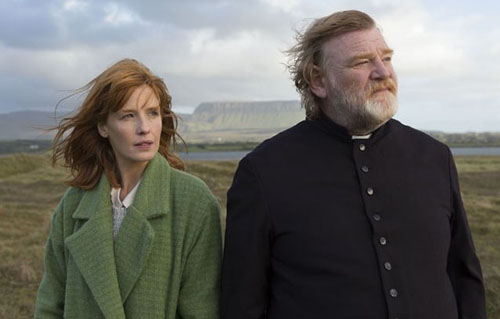Review: Calvary

The Catholic Church's seemingly endless scandals have been fodder for many great films, from the searing documentary Deliver Us from Evil to the star-studded critical darling Doubt to last year's sleeper indie hit Philomena.
The latest movie to address the church's sex scandals, the Irish drama Calvary, is one of the darkest. Equal parts whodunit (actually, who will do it), character study and meditation on faith, Calvary is a thoughtful film with a cold, grim heart.
Calvary's protagonist, Father James (Brendan Gleeson), is a marked man from the film's opening scene. During a confession, a bitter parishioner vows to kill Father James as retribution for being raped by another priest decades earlier. The parishioner doesn't accuse Father James of any wrongdoing; in fact, he singles him out for his innocence. "There's no point in killing a bad priest," says the anonymous voice in the confessional booth, "but killing a good one -- that would be a shock."
The would-be killer plans to kill Father James in a week, leaving the priest not much time but plenty of options. He could flee the quaint Irish seaside village where he ministers to his dwindling flock, but decides to stay out of a sense of duty. He also hopes to identify the man who threatened him and diffuse his anger.
Father James' decision to stay is a bit perplexing, given that many of the townsfolk are openly hostile toward him and the church he represents. They have no use for organized religion and let Father James know it whenever possible, rudely insulting and rebuking him whenever he tries to help them. And they do need help; the town may seem serene, but it's a lonely place plagued with alcoholism, domestic violence and an air of desperation.
The good priest deals with his own demons, too. A widower who became a priest after his wife died, he lives a lonely life except when his daughter, Fiona (Kelly Reilly), visits him. Fiona's life is no happier than her father's -- she suffers from severe depression, and in her first scene we see her bandaged wrist from a botched suicide attempt. But at least she's mostly supportive of her father; he welcomes her company out of parental concern, but also because everyone else seems to despise him.
If Calvary sounds like a grim affair, it most certainly is. Aside from some darkly funny moments -- a few of which are almost jarringly hilarious -- it's hardly the feel-good film of the year. But it is one of the year's smartest movies, as it considers the nature of religion and its role in an increasingly secular world. As the darkness surrounding Father James makes him question his faith in God, Calvary questions faith in general.
Calvary intertwines its theological ruminations with a sort-of-thriller built around Father James' fate. Moviegoers looking for American-style action and violence should look elsewhere, because Calvary unfolds its mystery deliberately and methodically. There is plenty of suspense, but it builds slowly as we meet half a dozen potential killers, all angry and conflicted men who, if primed with enough alcohol and despair, could easily convince themselves to commit murder. They're a sad and sorry lot, and we're surprisingly sympathetic toward them given that one of them may kill the film's most sympathetic character.
To Calvary's credit, it doesn't populate its somewhat clichéd seaside village setting with clichéd villagers. With a couple of forgivable exceptions -- a crotchety old throwback billed as the Writer (played for laughs by M. Emmet Walsh) and a hyperactive prostitute, Leo (Owen Sharpe) -- there are no endearingly quirky folk providing local color, as if the town pays them to charm tourists. The bit players in Calvary are more like jaded big-city folk with big-city problems, casting a grimy pall over the town and adding grit to the film.
But gritty as it is, Calvary is also visually stunning, all verdant Irish landscapes and beach vistas and colorful gardens. Writer/director John Michael McDonagh (who also teamed with Gleeson on The Guard) makes liberal use of place as character, and cinematographer Larry Smith captures this character in all its rugged natural beauty. Smith also plays with lighting to great effect; Father James is backlit in a particularly moving scene, as if surrounded by a halo his unsympathetic parishioners cannot or will not see.
As expected, Gleeson owns Calvary as Father James, playing him as weary but still unfailingly kind and empathetic (at least until the anger and cynicism around push him too far). Father James is a dedicated clergyman who goes about his pastoral duties with the patience of, well, a saint, even when he realizes the saints won't help him deal with his possible demise. Gleeson captures the essential nature of Father James perfectly, inhabiting a character who sees his physical death as less of a tragedy than his spiritual one.
Calvary is an odd mix of genres and may be too dark for most audiences. Still, with its aching bitterness, pitch-black humor and haunting beauty, it's a deeply satisfying film.

